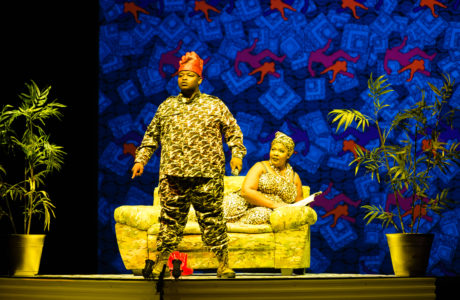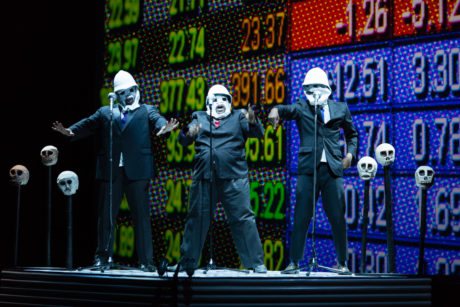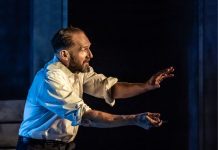I’ve long felt that if someone is going to cut down a Shakespeare text, they should take the responsibility of claiming co-authorship, since any editing becomes interpretation. This year’s Fringe concludes with two international works that accept the responsibility and succeed in creating new works, although in very different fashion. Romeo Castelluci’s Julius Caesar, Spared Parts leaves Shakespeare’s story behind (what text remains takes us only to the midway point of the play) for a meditation on, I believe, the fragility of the human body and of speech. Third World Bunfight’s Macbeth, adapted from Verdi’s operatic adaptation of Shakespeare, takes a common approach but does it expertly and to uncommon effect. This Macbeth is one of the most brilliantly conceived and executed theatrical productions I have seen anywhere in many years.

The company, created and led by South African Brett Bailey (who is responsible for the conception, direction, set and costume design of the piece, in addition to the colloquial free translation from Italian to English), creates work in a wide range of forms. Macbeth is Bailey’s first opera; he’s best-known for his controversial installation work Exhibit B, which explored the 19th century Western phenomenon of human zoos, which objectified African bodies for White eyes.
Working with Belgian composer Fabrizio Cassol, Bailey has cut Verdi’s opera to 100 minutes, reducing the cast to three main singers and a seven-person chorus and the orchestra to twelve members. The production imagines this cutting performed by an amateur opera company in the contemporary Congo. The company’s name is “L’Enfer c’est les Autres,” Sartre’s famous phrase from No Exit: Hell is other people.
In creating the piece, Bailey does political work simultaneously in two different registers. He reminds the audience of the ongoing conflict in eastern Congo, a conflict that has cost an estimated 6 million lives in the past 20 years. If you are like me, you remember this in passing every few months, or when you are confronted with something like this Macbeth: my suspicion is that most Americans never think of it. And why has this conflict persisted, at such horrendous cost: for control of mineral wealth necessary for first world conveniences such as cell phones, hard drives, and the lap top on which I’m writing this review.
Shakespeare’s tragedies and histories transfer unfortunately well to African settings. My companion mentioned before the show that her “definitive” Macbeth was a production by the British company Out of Joint, which used Zimbabwe’s independence struggle (and indigenous belief in magic) as a setting. Here, the witches are representatives of “Hexagon,” a mining company lures Macbeth into killing “Commander Duncan” to gain control of gold mines and other commodities. Bailey has rewritten many of their lyrics to incorporate phrases from the corporate literature of companies involved in the rape of Congo and its inhabitants. My favorite was “We are fully transparent/We are real.”
The second way in which this play does political work is in foregrounding ten brilliant African singers in the Eurocentric medium of opera. This is especially true in the case of the three featured roles: Owen Metsileng in the title role, Nobulumko Mngxekeza as Lady Macbeth, and Otto Maidi as Banquo. All three are young (Metsileng isn’t thirty yet) and deserve international stardom.

What makes this production so powerful though, is that Bailey insists on an aesthetic rigor matching the intellectual and political rigor of the adaptation. This is a visually and aurally gorgeous evening. It is also visually and, in the English supertitles, verbally witty. Macbeth’s crown is a red hat in the shape of a clenched fist. The sequence that includes Lady Macbeth’s expression of fear of Banquo, the Assassins’ song, and Banquo’s final aria is performed as a series of musical revue numbers. The Macbeths’ promise to “make Congo great again” was well-received by the opening night audience.
Bailey stages most of the piece on a small raised platform center stage. A screen behind the platform displays an animated panoply of projections (Bailey working with Roger Williams). Felice Ross’s lighting includes the downstage faces of the platform and adds to the movement and emotional content of the evening. The work of Conductor Premil Petrovic and the members of the Opera Philadelphia Orchestra was excellent throughout.
This is truly must-see theater.
Macbeth is a co-presentation of Opera Philadelphia and FringeArts plays at the Prince Theater – 1402 Chestnut Street, in Philadelphia, PA. Tonight’s final performance – September 25th at 7 PM – is sold out, but last minute tickets may be available at the theater.
LINK:
The Libretto of Verdi’s Macbeth.
RATING:
BEST OF THE 2016 PHILADELPHIA FRINGE!




